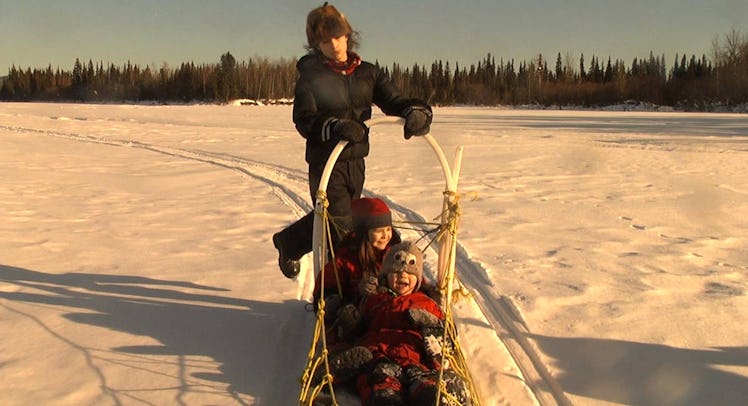The 5 Benefits of Getting Your Family Off the Grid
Lessons from a life unplugged.

For nine months, the Crocker family lived in a cabin deep in the Yukon wilderness. They were 175 km from the nearest town, surviving off picked berries and a storage of non-perishable foods in a place where the temperature drops to 40 degrees below zero. The family of 5, which includes three kids aged 10, 8, and 4, also had no access to electricity, running water, clocks, or watches. This is how people did it before Ben Franklin’s kite got zapped and binging became synonymous with Netflix. You’re probably terrified right now — but their kids? They loved every minute of it.
The purpose of the getaway was ostensibly so the family could press reset on their lives, get back to a simpler, natural existence, and — most importantly — connect with one another again. Was it easy? F–k no. But the experience seemed to have the intended effect on the kids. Suzanne Crocker captured her family’s journey in what would become the documentary All The Time In The World. It’s a testament to the transformative power of not having any power. Below she talks about the good it did her family, and how even parents who are constantly paired to their phone can follow in their footsteps.
RELATED: What ‘Road to Perdition’ Taught Me About Leaving Legacies For Our Kids
Kids Become More Self-Sufficient Than You Can Imagine
When you live out in the woods, kids have no choice but to pull their own weight. Suzanne says that once they were free from restraints or boundaries, hers easily took to that Oregon Trail life.
“The kids were just an integral part of life in the bush,” she says. Suzanne and her husband trusted them to chop wood, drive the Ski-Doo, haul water from the river, peel logs, and start fires. They used axes and knives and even helped stitch up their wounded father (sorry Dad). In fact, the only thing the kids didn’t touch was the chainsaw.
Granted, her children were well-taught (both parents are former doctors and experienced outdoorsmen) but when they were on their own, the kids never hurt themselves. Plus, the lack of distractions offered ample time to practice and focus on the arduous tasks. There’s less chance of chopping off a limb when you aren’t scrolling through Instagram at the same time.
MORE: What It Was Like to Grow Up Completely Off the Grid
Boredom Becomes A Thing Of The Past
At first, Suzanne’s kids didn’t want to leave their iPads, board games, or toys behind … because they’re kids. She honestly thought they’d have a hard time adjusting to a life without crushing candy or flixing net. But all of that access to the natural world seemed to keep them busy.“In 9 months I never heard the words ‘I’m bored’ from my kids’,” she says.
The kids actually dealt with distraction-free time better than the parents did. With just a few bare-bones supplies (not including bear bones), the kids developed their own board games and toys. They wrote drew comic books, wrote stories, and read their creations. Even better? “They never got tired of hanging out as a family,” says Suzanne. Although, issue number 2 of “Chainsaw Dad” could have come a little sooner.
Creativity Skyrockets
The Crocker kids were pretty agile out-of-box thinkers prior to their time away, but afterward “their creativity skyrocketed,” says Suzanne.
It’s easy to see why. During the 9 months, her kids created everything for themselves. On Halloween, they made their own costumes and mock trick-or-treated with their family (at least they didn’t have to check the candy). Everything they used to buy at a store they had to build from scratch. In their pre-Yukon life, the family had a weekly movie night. Without electricity, they still kept that routine except the kids made their own movies. “They’d go off once a week and tell a story,” says Suzanne. “And we’d listen to those instead of watching the movie.”
ALSO: You’ll Feel Weird Spending Time Away From Your Family. Do It Anyway
You Connect As A Family
There was one big reason this family trekked into the wilderness — to spend more time together. “When you’ve got a young family, there doesn’t seem to be enough time to hang and spend with your kids,” Suzanne says. “We felt that we were starting to grow apart because of that.”
And the bonding worked. Suzanne said she was present for the first time when she talked to her kids. She wasn’t thinking about the clients she had to meet or anything else — she was really listening to what they were saying, and they were really listening to her. “It’s so important to just have some time where you’re in the moment with your kids without distraction,” she says. “That’s the lesson that I learned.”
Benefits Of Unplugging Last Even After You Plug Back In
It’s been 6 years since the Crockers went into the woods, but their off-the-grid lifestyle still resonates. “It was pivotal in their lives,” Suzanne says.
The biggest change that stuck is that her kids have learned how to use their free time. While other kids tend to rush straight to the computer as soon as they get home from school, her former wild children don’t look to it as a source of creative inspiration or the only place to seek entertainment. And they still come up their own activities. “They’re quite capable of spending a full day never being on a computer and not bored.”
This article was originally published on